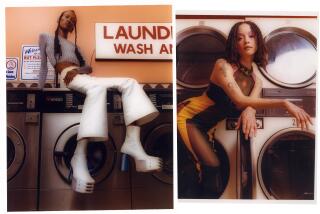Book review: ‘Life Would Be Perfect If I Lived in That House’ by Meghan Daum
- Share via
Life Would Be Perfect If I Lived in That House
Meghan Daum
Alfred A. Knopf: 256 pp., $24.95
In “Life Would Be Perfect If I Lived in That House,” Meghan Daum recounts her search for a living space that would allow her to feel at home. In part, she declares, that quest has to do with houses, “ones I’ve lived in and ones I haven’t, ones I’ve lusted for, ones I’ve reviled, ones I’ve left too soon, and ones where I’ve found myself stuck, chained to my own radiator by the tethers of my own stupid decisions.” Yet as she moves in and out of temporary residences, never quite coming across the one that would complete her, she finds herself “hungry to the point of weakness for something that would root me to the earth.” Eventually, she does discover such a house and tries to transform it into a dream home, at which point her story begins to read like an illustration of the adage that when God wants a laugh, he answers our prayers.
Setting obviously plays a large role in the book, and Daum offers plenty of dwelling details without letting things degenerate into an episode of “Trading Spaces.” Whether a Vassar dorm room, a prewar apartment on the Upper West Side, a Nebraska farmhouse or an Echo Park house on a hill, each place she has lived is richly drawn. Daum, a weekly Op-Ed columnist for the Los Angeles Times, deftly captures the emotions of relocation: “the suspension of disbelief required to pull out of a driveway that is no longer yours, coast through a neighborhood that will soon no longer be home, and pass … the landmarks that … have long been the only thing standing between disorientation and sweet familiarity. No one ever talks about the importance of staring straight ahead while making this exit.… Like breaking up with a lover, you need to be as gracious as possible, but even more so you just need to walk out.”
Much of “Life Would Be Perfect If I Lived in That House” takes place when Daum is single, but she has no intention of succumbing to “the tragedy of the single woman who won’t buy decent furniture because she’s waiting to get married.” Instead, she takes the dangerously clichéd premises that surround a single woman looking to buy a house and carefully prunes away the same old stories. Some of what she confronts, however, is fascinating in its archaism. When her house is in escrow, she is required to sign half the forms as “Meghan Daum, an unmarried woman.”
Still, the metaphor of romance makes perfect sense in the context of real estate. “Moving, like chocolate and sunshine,” Daum writes, “stirs up many of the same chemicals you ostensibly produce when you’re in love.… Like a new lover, a new house opens a floodgate of anticipation and trepidation and terrifying expectations fused with dreamy distractions.” Beyond these particulars, Daum captures the now-gone moment when real estate became a national obsession: “The whole world, or at least the whole country, was buying real estate and melting it down to liquid form and then injecting it into veins.” She chronicles the shared madness of those who could only take breaks from watching HGTV to discuss closing costs.
At times, “Life Would Be Perfect If I Lived in That House” reads a bit like an addiction memoir. Like many addictive tendencies, Daum’s has roots in childhood. She describes her family as possessed by “a chronic, lulling sensation of being aboard a train that was perpetually two stops away from the destination we had in mind for ourselves,” always contemplating “what possibilities for happiness might lie at the destination point of a moving van.”
As she moves from coast to coast and in between, Daum is consistently relatable. In the end, she settles in Los Angeles, which is, she explains, “nothing if not the geographical equivalent of Baby Bear’s porridge: not too cold, not too hot, but, rather, a study in the unsung pleasures of lukewarm.” Her descriptions of the neighborhoods north of downtown — Silver Lake, Echo Park, Angelino Heights — are meticulous enough to play Name That Intersection, and the details of her house-hunting will please local readers.
There’s a sense that once a perfect home is established, we suddenly become functional adults. “I knew it wasn’t just a house I was after,” Daum writes, “but, rather, proof of my existence. It was the only thing that would make me desirable, credible, even human.” As she moves from house-lusting to house-buying, and, shortly thereafter, to sharing a home with a partner, she struggles with the idea that she doesn’t want to live with someone so much as to have a witness to the beauty of her home. Daum’s discomfort with coming around to the reality of shared space is honest and endearing and somehow captured in this moment. Her boyfriend moves in and they put the spare mattress out on the lawn for pick-up, in the same 24-hour period that the Google Earth satellite photographs her home for virtual eternity.
Daley is a Los Angeles-based writer.
More to Read
The biggest entertainment stories
Get our big stories about Hollywood, film, television, music, arts, culture and more right in your inbox as soon as they publish.
You may occasionally receive promotional content from the Los Angeles Times.










